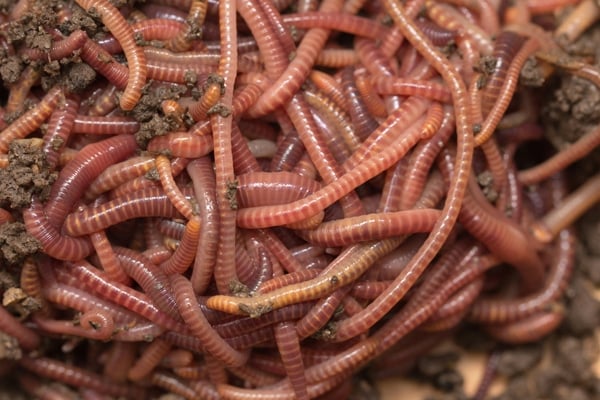Red Wiggler Express: Providing Anglers with Top-Notch Worms
Red Wiggler Express: Providing Anglers with Top-Notch Worms
Blog Article
The Extraordinary World of Red Wigglers: Increase Your Dirt Fertility Today
These small yet reliable organisms transform natural waste into valuable worm castings, dramatically enhancing dirt health and advertising sustainable techniques. As we explore the advantages of vermicomposting and the practical actions to create an efficient worm bin, the possible influence of these worms on your horticulture success becomes progressively evident.
Understanding Red Wigglers
Red wigglers, clinically understood as Eisenia fetida, are a species of earthworm that play a crucial function in enhancing soil fertility. These worms prosper in organic-rich settings, such as compost heap and decomposing plant material, where they consume organic waste and secrete nutrient-dense castings. Their special makeup, featuring a segmented body and a clitellum, allows them to replicate swiftly and successfully procedure huge quantities of organic matter.

The environmental significance of red wigglers extends past mere waste handling; they add to the soil food web, cultivating a diverse area of microbes that even more enhance dirt health and wellness. Comprehending the biology and behavior of red wigglers is crucial for utilizing their complete capacity in sustainable farming and horticulture practices.
Advantages of Vermicomposting
(Red Wiggler Express)Using the power of red wigglers through vermicomposting deals various advantages that considerably boost soil health and wellness and fertility. One of the main benefits is the production of nutrient-rich worm castings, which are a superb natural plant food. Red Wiggler Express. These spreadings contain necessary nutrients like nitrogen, phosphorus, and potassium, promoting durable plant development and improving crop returns
Additionally, vermicomposting improves dirt structure and aeration. The visibility of worm spreadings improves soil structure, permitting better water retention and drain. This well balanced dampness level is vital for origin development and the general wellness of plants. Red wigglers aid damage down organic matter, accelerating decay and reusing nutrients back right into the dirt.
Vermicomposting also promotes microbial activity, which is crucial for a healthy soil environment. Beneficial microbes thrive in the presence of worm castings, helping in the failure of organic products and enhancing vitamins and mineral accessibility to plants.
Finally, vermicomposting acts as a reliable waste management option, reducing garbage dump waste by reusing kitchen scraps and other organic products. This not only adds to ecological sustainability however also promotes a round economic climate within gardening and agriculture.
Just How to Establish Up a Worm Container
Setting up a worm bin is a simple process that can considerably enhance your composting go to these guys initiatives. Begin by picking an ideal container, which can vary from a commercially available worm container to a basic plastic or wooden box (Red Wiggler Express). Ensure the container has adequate air flow; little holes in the lid and sides will help with air circulation
Next, develop a bed linens layer to offer a comfy atmosphere for the red wigglers. This can be made from shredded newspaper, cardboard, or coconut coir, dampened to a moist, sponge-like consistency. Load the container to about one-third full with this bedding product.
As soon as the bed linen is prepared, it's time to introduce the worms. Red wigglers grow in natural waste, so place them gently onto the bedding. Cover the worms with a light layer of added bed linens to assist them accustom.
Feeding Your Red Wigglers
Providing the appropriate food for your red wigglers is crucial for their health and the performance of your composting system. Red wigglers flourish on a diverse diet plan, primarily containing organic materials such as vegetables and fruit scraps, coffee premises, and shredded paper. These materials not just provide crucial nutrients however likewise add to the microbial activity in the worm container, which is essential for the worms' food digestion.
It is essential to avoid specific foods, such as milk products, oils, and meats, as these can attract parasites and produce unpleasant smells. Additionally, citrus peels and excessively zesty foods need to be limited as a result of their prospective to damage the worms. A balanced technique to feeding involves keeping an eye on the amount of food introduced to the bin, ensuring that it is taken in within an affordable timespan to avoid excess waste accumulation.
To advertise optimal food digestion, it is useful to slice or shred bigger food things before adding them to the bin. This practice raises the area for microbial activity, facilitating quicker decay and boosting the general effectiveness of your composting system. Regularly observing the worms' feeding habits will certainly assist you adjust their diet as needed.
Utilizing Worm Spreadings in Your Garden

(Red Wiggler Express)Including worm spreadings into your garden can be completed by blending them into the soil or utilizing them as a leading dressing. The slow-release nature of these spreadings makes certain that nutrients are offered to plants over an extended duration, lowering the demand for synthetic fertilizers. In addition, worm castings contain valuable microbes that promote healthy dirt environments, enhancing the total resilience of your yard.
To maximize the advantages, objective to use around one part worm spreadings to three components dirt in your growing beds. Regular applications can bring about improved plant yields and much healthier plants, making worm castings a very useful resource for both amateur and skilled garden enthusiasts alike. By utilizing this all-natural amendment, you can grow a thriving garden while adding to sustainable horticulture practices.
Final Thought
In final thought, red wigglers exhibit the essential role of vermicomposting in enhancing soil fertility. Their capacity to transform natural waste into nutrient-rich spreadings considerably enhances dirt framework and sustains microbial diversity.
Report this page